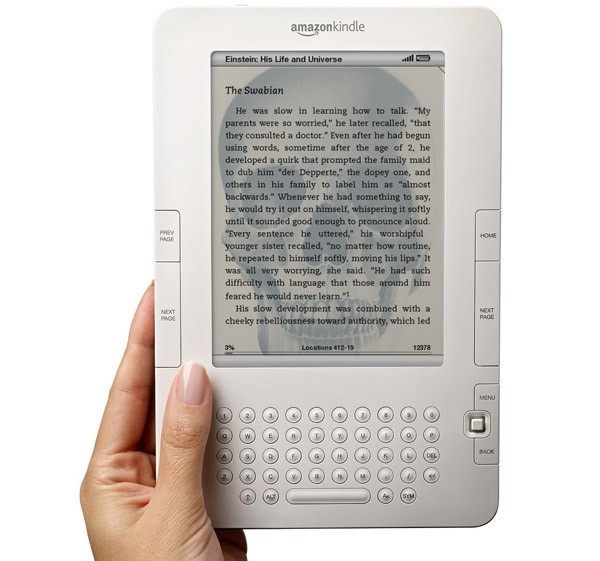
I finally got around to reading Nicholson Baker’s piece on Amazon’s Kindle – the device that will finally do away with The Book. I could, of course, have read it online three weeks ago but I had misplaced that edition of the New Yorker and I just knew I had to read about the Kindle on hard core hard copy actual print.
So the fabulous and funny Mr Baker writes:
‘Everybody was saying that the new Kindle was terribly important—that it was an alpenhorn blast of post-Gutenbergian revalorization … In Newsweek, Jacob Weisberg, the editor-in-chief of the Slate Group, confided that for weeks he’d been doing all his recreational reading on the Kindle 2, and he claimed that it offered a “fundamentally better experience” than inked paper did. “Jeff Bezos”—Amazon’s founder and C.E.O.—“has built a machine that marks a cultural revolution,” Weisberg said. “Printed books, the most important artifacts of human civilization, are going to join newspapers and magazines on the road to obsolescence.”
By the time Baker gets to open the Russian doll nest of boxes the machine arrives in he is primed for disappointment:
‘The problem was not that the screen was in black-and-white; if it had really been black-and-white, that would have been fine. The problem was that the screen was gray. And it wasn’t just gray; it was a greenish, sickly gray. A postmortem gray. The resizable typeface, Monotype Caecilia, appeared as a darker gray. Dark gray on paler greenish gray was the palette of the Amazon Kindle.
‘This was what they were calling e-paper? This four-by-five window onto an overcast afternoon? Where was paper white, or paper cream? Forget RGB or CMYK. Where were sharp black letters laid out like lacquered chopsticks on a clean tablecloth?’
When he is not being funny Baker points out the central, meanest problem with the gadget:
‘Here’s what you buy when you buy a Kindle book. You buy the right to display a grouping of words in front of your eyes for your private use with the aid of an electronic display device approved by Amazon … That means you can’t read your Kindle books on your computer, or on an e-book reader that competes with the Kindle … Kindle books aren’t transferrable. You can’t give them away or lend them or sell them. You can’t print them. They are closed clumps of digital code that only one purchaser can own. A copy of a Kindle book dies with its possessor.’
+++
And that’s it. Like Steve Jobs and Apple and its iPod and its iTunes Store, Jeff Bezos want to control the distribution (Amazon), the electronic delivery system (Kindle) and the content (the book you paid the rights to read) till death do you part.
+++
About a year ago I wrote a piece for Meanjin (the Melb. Uni. Quarterly) about the Kindle and the future of books. Which was odd as the editor had expected a piece about book design (I design books). However, she was gallantly excited and published it. It was a mock prophecy, a parody, a polemic. I had just become persuaded that some later more highly evolved Kindling would be the future of books and I was depressed with a deep and unenthusiastic conviction.
I am still of the same conviction, and even less enthusiastic. One of the lovely things about books is that they are their own creatures, each title with its own shape and weight and cover and colour and paper and typesetting and high or low production values. A kindley thing will always be showing you its content in the same window of the same machine. We are, post modernists all, departing the shores of the physical…
Here is the piece from Meanjin:
The Post-Gutenberg Prophecy
Lo! In the very hour of the triumphant ascent to the peak in this golden age of book packaging, designers are troubled by a shivery vision: descending the same mountain top is the bald-headed prophet named Bezos, his slight arms full of the tablets called Kindle.
Kindle, and bastard kindling, will soon be in the universal possession of the diminishing literate, who will be able to download books and carry whole libraries around as we now carry our music in MP3 players. This post-print book will be a book of books. On a device no bigger or heavier than a paperback, our selections will appear on a light-reflective, page-sized screen that will transmit type just like paper.
Behold, within a generation’s span, only illustrated books will justify the costs of printing — books which require the complex overlapping qualities of flickability, stillness and robust actuality: those dealing with cooking and gardening, art and pornography, maps and folio-sized references, comix and graphics and hobbies. All the titles we now see at the front of book stores will disappear — shelves will empty and A to Z will be framed in air. We will slipstream from analogue to digital, as books “become a single liquid fabric of interconnected words and ideas.”
And woe betide us! For we shall no longer have the guilty pleasures of cracking a spine or dog-earring a page. No longer the fine judgement of throwing a book across the room, with its satisfying thump. No longer to grasp the measure of a novel by the heft of the remaining pages. No more underlining sentences or scoring exclamation marks in the margin. No more the autographed object. Haptic turns optic.
Music graphics atrophied as 12-inch vinyl LPs spun into 12cm silver discs. But books will shift radically from printed matter into ethereal files in a single shattered paradigm. And so it is that Marketing’s dark artists will meet their nemesis — uncontrollable word-of-blog. In the new era of the PoGu book the machine shall host the ghost, the letter shall become spirit. Ever alas, and amen.








Crikey is committed to hosting lively discussions. Help us keep the conversation useful, interesting and welcoming. We aim to publish comments quickly in the interest of promoting robust conversation, but we’re a small team and we deploy filters to protect against legal risk. Occasionally your comment may be held up while we review, but we’re working as fast as we can to keep the conversation rolling.
The Crikey comment section is members-only content. Please subscribe to leave a comment.
The Crikey comment section is members-only content. Please login to leave a comment.